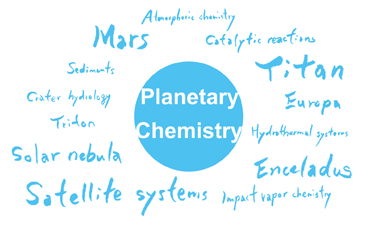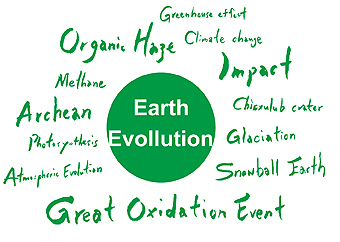Research interests
地球はどのようにして今の姿になったのか? 宇宙に生命を宿す天体は存在するのか?
How can Earth be a habitable planet? In there life beyond Earth in the
Solar System?
どうやって惑星の大気や海洋ができ、それらが現在までどのように変化してきたのかという起源と進化について調べることで、生命を育む惑星とは何かを理解したいと考えています。
特に、大気化学、光化学、火山・熱水活動、化学風化、天体衝突など多様な地質・物理現象に付随しておきる表層環境の化学に注目し、それらを室内実験、理論計算や野外調査によって調べています。地球惑星進化を理解するためには、上のような素過程の理解と同時に、大気・海洋などの構成要素が相互作用するシステムとして惑星をとらえる視点、他の惑星との比較を通じて普遍性や特異性を理解する視点が重要になります。私は、
1)惑星化学 2)地球大気進化
を2つの柱とし、地球とはいかなる惑星なのかを理解したい、そして太陽系外惑星の表層環境推定や生命生存可能性に迫りたいと考えています。具体的な研究対象は、下のリンクを参照してください。


My research keywords include Planetary Chemistry (atmospheres, aqueous chemistry, climate, and geology) and Earth evolution (atmospheric redox, paleoclimate, Great Oxidation Event, and hydrological cycles).
We study surface environments that can support life in the Solar system,
including Enceladus, Europa, Titan, and Mars. To understand the habitability
in the Solar System and beyond, we need to develop a comprehensive understanding
of chemistry on habitable planets/satellites that can support life.
To this end, we focus on the following topics; 1) to introduce chemical
reactions into surface processes on planetary bodies (via laboratory experiments
and modeling), 2) to expand understanding of biogeochemical cycles occurring
on Earth to other planets (via geological field research and modeling),
3) to understand the feedback among the atmosphere, ocean, and life occurred
in Earth’s history (via geochemical analysis and modeling), and 4) to apply
the above understanding for interpretations of spacecraft observations
(e.g., Cassini, Curiosity, and JUICE).